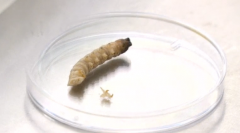
ENGLAND, United Kingdom (Reuters) — Scientists tracking a crop-destroying caterpillar known as armyworm say it is now spreading rapidly across mainland Africa and could reach tropical Asia and the Mediterranean in the next few years, threatening agricultural trade.
Researchers at the Britain-based Centre for Agriculture and Biosciences International (CABI) said the pest, which had not previously been established outside the Americas, is now expected to spread “to the limits of suitable African habitat” within a few years.
The caterpillar destroys young maize plants, attacking their growing points and burrowing into the cobs.
Armyworm, known as “fall armyworm” in the United States due to its tendency to migrate there in autumn, or fall, is native to North and South America and can devastate maize, a staple crop crucial to food security in large parts of Africa.
“It came in we think through trade potentially and it loves maize but not only maize also other crops so we are extremely concerned over this problem because maize is the largest grown cereal in sub-Saharan Africa and it’s grown by small-holder farmers so their income, their livelihoods and their food security will be at threat if this maize problem is spreading,” said CABI agronomist and invasive species specialist Dr Janny Vos.
Suspected outbreaks have already erupted in Zambia, Zimbabwe, Malawi and South Africa and the U.N. Food and Agriculture Organization said last week it had spread to Namibia and Mozambique.
The CABI research used DNA analysis to prove the presence of two species of fall armyworm in Ghana for the first time and scientists are now working to understand how it got there, how it spreads, and how farmers can control it in an environmentally friendly way.
“They often come in as an egg mass or as a pupa and they are very, very small and difficult to be noticed. So what is important is to know how it looks like when it comes out and how the damage looks like so that you can react very, very early and we think that window has been missed on this occasion,” Vos said.
While armyworm mainly affects maize, it has also been recorded eating more than 100 different plant species, causing major damage to crops such as rice and sugarcane as well as cabbage, beet and soybeans.
Vos warned that outbreaks can cause devastating losses for farmers and said urgent action is now needed to help farmers figure out the best strategies to control the pest.
South Africa’s agriculture ministry said last week it was registering pesticides for use against armyworm.








